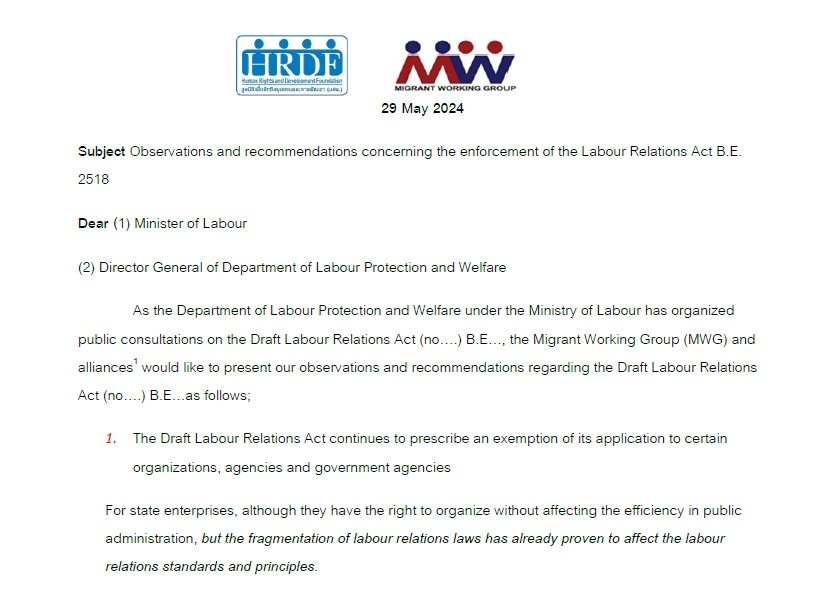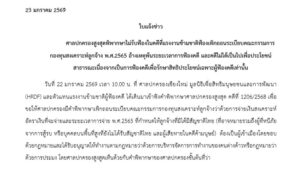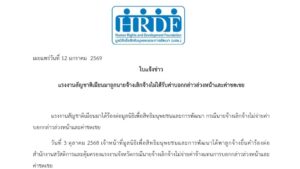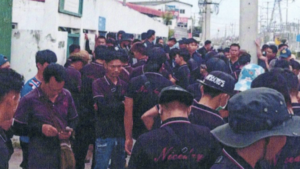29 May 2024
Subject Observations and recommendations concerning the enforcement of the Labour Relations Act B.E. 2518
Dear (1) Minister of Labour
(2) Director General of Department of Labour Protection and Welfare
As the Department of Labour Protection and Welfare under the Ministry of Labour has organized public consultations on the Draft Labour Relations Act (no….) B.E…, the Migrant Working Group (MWG) and alliances[1] would like to present our observations and recommendations regarding the Draft Labour Relations Act (no….) B.E…as follows;
1. The Draft Labour Relations Act continues to prescribe an exemption of its application to certain organizations, agencies and government agencies
For state enterprises, although they have the right to organize without affecting the efficiency in public administration, but the fragmentation of labour relations laws has already proven to affect the labour relations standards and principles.
Recommendation: Merge all the labour relations laws into a code of law
This can ensure that workers in public sector and state enterprises, and in private sector in both formal and informal economies, shall be subject to the same principles and standards of labour relations, to afford freedom of association, and to attain flexibility that allows them to become a member of the same labour union. Since all labour unions are interrelated, this can help to enhance their unity and strength for the labour movement and it will eventually benefit the development of labour relations system.[2]
To ensure there are no inconsistencies and deviation concerning the principles and standards of labour relations which may give rise to inequalities and to ensure compliance with international principles and standards.
Should it be necessary to legislate different laws, there must be an assurance that workers in private sector, state enterprise workers, and workers in public sector as well as workers in informal economy shall be subject to the same principles and standards of labour relations and all these laws must be interrelated.
2. The definition of “employer” and “employee” should be revised to offer protection to a contract employee (draft Sections 4 and 39), although it does not apply to workers, or those employed to work based on the hire of work contract as well as informal economy workers without employer. MWG deems that owing to the drastic change in employment and business, it has given rise to employment formats and relations more than just the conventional relations between employer and employee. As a result, many emerging kinds of workers may not be subject to the enforcement of the law. Such laws lack inclusivity and are not compatible with the drastically changed social condition and are not in compliance with international labour standards.
Recommendation Legal reform should be made to ensure its applicability to workers in all professions, regardless of the workers have the legal relations akin to the conventional employer and employee or not. This can ensure they fall under the same principles and standards of labour relations.
3. Dispute mechanism
MWG deems that the representation of individuals and groups in the Labor Relations Committee mandated to award a labour dispute according to the law, or as designated by the Minister of labour to award such dispute is still inappropriate and lacks diversity and the process to award a labour dispute is still subject to an internal management lacking clarity and without the involvement of employees or workers.
Recommendation Ensure that individuals, or groups of individuals or the Labor Relations Committee mandated to mediate or award a labour dispute can help to achieve the collective bargaining agreement that meets the intention of those who submit the demand, is appropriate and fair based on the context, and include representation of experts.
4. Lock-out and strike
MWG deems that in several sectors, there exist laws that restrict the right to lock-out and strike which is not in compliance with international labour standards. The process of lock-out and strike is still mired in practical and legal problems including;
- Is it possible to conduct a partial lock-out or strike, i.e., by lock-out of certain workers, or conducting lock-out or strike during certain periods of time?
- Can workers who do not sign up or are non-members participate in the strike?
- During the submission of demands, and when the employer resorts to exercising the right to lock-out, it shall affect contract workers, who according to the law are not considered involved with the demands. The employer may invoke the contract work agreement to send all contract workers back to the employer of the contract workers. And in most cases, the employer of the contract workers is located far from or in a different province of the workplace.
- When a dispute arises between the employer and the employee, or during the poor labour relations environment, even though the demand has been submitted, it is virtually impossible to negotiate. The employer often resorts to accelerate the process in order to declare a lock-out and is not willing to negotiate to reach an agreement. The law does not prescribe as to how long the lock-out can be conducted. As a result, there has often been that lock-out that protracts indefinitely causing much trouble to the employee. In addition, any employee or labour union’s member targeted by the lock-out, if they happen to get pregnant or get sick and need to receive medical treatment, or are in a vulnerable situation, there is simply no legal measure or policy that helps to take care of such vulnerable employee or worker.
Recommendation
1. Even though the demand and negotiation has led to a strike or a lock-out, both parties can still try to negotiate and medicate, or may appoint an arbitrator. Any party who is not satisfied with the award outcome, can still bring the case to the Labour Court.
2. Measures that should be put in place when a lock-out and strike is conducted in critical public services should include;
1.1 For critical public services including electricity, tap water, telecommunication, aviation services, transportation by land, water and air along with supporting services, and;
1.2 The services that the Labor Relations Committee requires that a minimum and necessary service management plan must be made prior to the lock-out/strike to ensure safety in life and public health and the availability of the public services.
3. The employer and representatives from labour union, or elected representatives of employee shall collectively prepare the minimum and necessary plan by setting out the framework of the law according to the law. Such minimum and necessary plan shall apply to the employer, the labour union, the employee and those required to perform their duties according to the plan. Prior to calling a strike in the business, those involved with the strike must inform the employer at least seven days in advance and shall make the announcement to the public in advance for the same duration of time.
4.During the strike or the lock-out, the employer shall be prohibited to enter into an agreement to hire or to manage the situation in any way to allow an individual or a juristic person to work in lieu of the employees engaging in the strike or the employer’s lock-out.
5. The requirement for the decision to call a strike to be supported by the votes of more than one-half of the total number of members of the labor union and the votes have to be cast in secret should be repealed.
5. The establishment of employees’ organization and employers’ organization
MWG deems that the labour relations law is focused on exerting the control or restriction of rights and freedoms in the labour relations system making the law not in compliance with international standards. For example, it requires that the establishment of employees’ organization and employers’ organization must be registered with the state and the registrar has power to disband the establishment of employees’ organization and employers’ organization.
Recommendation The establishment, objectives and operation of establishment of employees’ organization and employers’ organization have to be free and independent without having to be subject to control or permit system.
6. Unfair practices
MWG deems that the legal provisions do not apply to all practices during the preparation or initiation to establish an organization. There are various activities including training to raise the awareness about the principles of labour relations and other preparation activities which do not just include the meetings to found an organization or the submission of notification to establish an organization.
The legal provisions appear passive since they allow the employer to have the right to terminate employment or to treat the employee in whatsoever way when the workers start to get organized or to submit the demands, although the workers still have the judicial recourse. This impedes the right to organize of the employee and leaves them with a burden to fight their case in the court. This may not serve the intention of the law in terms of protection.
Case study: For migrant workers who are holders of border passes and get registered as workers pursuant to Section 64 of the Royal Ordinance Concerning the Management of Foreign Workers’ Employment B.E. 2560, they are required to renew their work permits every three months even after having been working for three or four years already. And if the employees get organized to submit their collective bargaining demands, or when they get into a dispute with the employer who is not happy with the submission of the demands, the employer may decide to not allow the employees to renew their permits. This gives rise to a problem regarding legal interpretation to prevent unfair practices, since it could be deemed the exclusive right of the employer whether to extend the employment or not, even though there is an obvious conflict in doing so.
Recommendations
1. Legal measures should be put in place to protect the employees or the workers who are about to establish a labour union from facing the termination of their employment or facing disciplinary sanction. And they should apply to any act that appears to be a harassment or opposition to the unionization.
2. Legal measures should be put in place to protect the founding members of labour unions, board members of the labour union, subcommittee members appointed by the labour union, representatives engaging in demand negotiation and advisors to the demand negotiation.
It is prohibited to terminate the employment, to impose disciplinary section, or to act in any way which appears to harass or oppose the performance of duties according to the law, except when permission is granted by the court and when such termination of employment is clearly stipulated in the law.
3. Extend the protection to apply to any filing of complaint or exercising of legal rights concerning labour issue. This should also apply to the laws concerning the foreigners’ working management and the management of workers in public sector as well. The protection should also be expanded when both the employer and the employee are involved with the demand, or when a labour union is bringing the case to the court, whether it is a labour case, or other case related to the issue or the problem which gave rise to the labour dispute.
4. Amend Section 121 of the Labour Relations Act B.E. 2518 to apply to the following cases;
4.1 The employer who refuses to recruit an applicant citing they used to be a member of labour union, or a board member of labour union, or used to participate in a labour union’s activities.
4.2 When the employee or the employees’ organization exercises their right to complain about their employer with the National Human Rights Commission, business ethics mechanisms, and business and human rights protection agencies.
5. It should be prescribed in the law for the provision of damages as a result of the unfair practices since they infringe on the right to organize, or to associate, in order to submit the demands and negotiate to achieve the collective bargaining agreement to ensure justice.
7. Punishment MWG deems that the criminal punishment is still inappropriate and not enforceable which may compel the employer or the offender to change their behavior or to feel deterred by such criminal sanction. In reality, there has been no criminal measure to ensure the acts according to the intention of the law. On the contrary, many criminal measures have been used to target the labour union leaders, or leaders of the employees, or other individuals offering help to the employees during the submission of demands and negotiation.
Recommendation The criminal and punitive measures should be reviewed to ensure they are appropriate with the situation and the circumstance of the acts that violate the core principles of the law. Such criminal punishment should be clustered or classified to ensure the imposition of appropriate sanction. For pity crime, or anything that does not violate the core principles of the law or public interest, a fine should be imposed.
For more detail, please contact Adisorn Kerdmongkhol, Migrant Working Group (MWG), 089 788 7138 email: co*****@*********nd.org
[1] Migrant Working Group (MWG) is a network of nongovernmental organizations whose work is concerned with migrant populations regarding their health, education and their rights. Primarily, we aim to enhance the exchange of information regarding a network of migrant populations, the problem analysis, the identification of policy issues and collaborations in advocacies with governmental agencies, academic sector and civil society sector with an aim to ensure migrant populations afford basic rights to enhance their quality of life.
[2] Regarding the issue of double standards, for example, the Labour Relations Act B.E. 2518 prescribes that in a workplace, there can be different labour unions. But according to the State Enterprise Labour Relations Act B.E. 2543, in one state enterprise, there can only be one labour union, and it requires that only the labour union shall have the right to submit the collective bargaining demands.





